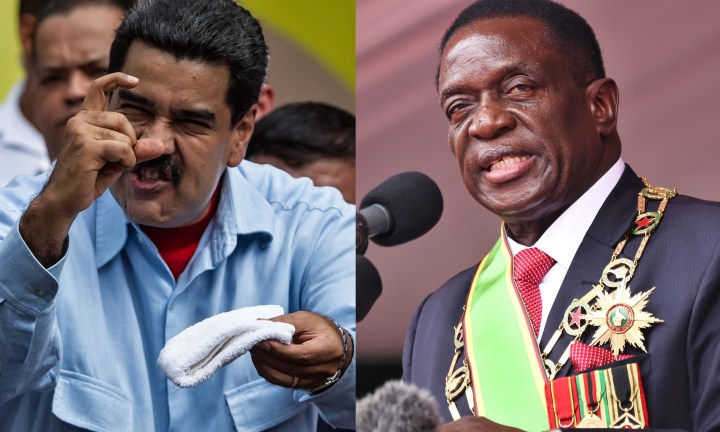Op-Ed
Getting from Collapse to Recovery: Zimbabwe’s Parallels with Venezuela

Venezuela’s economy is in free fall, with inflation expected to top one million percent this year. The production of its principal source of revenue, oil, has halved under the red beret ‘revolutionary’ Bolivarian regime led by Hugo Chavez and, now, Nicolas Maduro. Its politics are in turmoil: with the state blending a mix of violence and intimidation to coerce the opposition. The challenge of turning this situation around is, however, well known to southern Africans.
Venezuela’s situation draws parallels, inevitably, with the most recent case of hyperinflation, that of Zimbabwe, which suffered a rate of 79-billion percent before it was dollarised in 2009. The parallels don’t end there, since the ruling Zimbabwe African National Union (ZANU) party has established a similarly extractive and corrupt political economy to Chavez, and poverty has mushroomed in the circumstances. And the Zimbabwean economy has declined in per capita terms by half since independence in 1980, largely a result of the redistributive and corrupt urges of ZANU.
There are, of course, differences. For one, the majority of Latin American states, as represented by the 17-nation Lima Group, are unsupportive of the Maduro government’s ‘democratic’ tactics. In southern Africa, the region – with the notable exception of Botswana – closed ranks around Robert Mugabe’s rule, preferring a soft landing in the form of the creation of a Government of National Unity when he lost the 2008 election, or indeed no landing at all. Whereas the Zimbabwe government has used humanitarian food assistance to reduce its responsibilities to its own population and its distribution to maintain political control, Venezuela has refused such assistance despite dire circumstances to maintain its own distribution and control networks.
Perhaps harshly, Venezuelan activists have been very willing to take their fight to the streets, more so than Zimbabweans. No fewer than 120 were killed in the Caracas uprising of 2017 for example.
There are other similarities: For one, these crises go on for much longer than imagined sustainable, even when things appear as bad as they can get. Both cases have involved the ruling party’s (and specifically, the military’s) control of natural resources, in Zimbabwe’s case diamonds. Both possess a mythology of liberation politics, blending this equally over time with repression, intimidation and fear. They have engineered a dependency on the state, using access to resources as a tool of loyalty. There is a relatively low cost to repression, and a high cost for the elite of losing power, which remains a disincentive to change. Both countries have had targeted sanctions imposed on the ruling elite, which employs this as an excuse as to why the economy has melted down, even though this has nothing to do with the folly of their decisions and illegal actions which caused the crisis.
While the opposition in both expect, or hope, more dramatic forms of external intervention, it has not come to pass, despite the fact that Zimbabwean activists always claim this was because the country lacked oil. Whereas Zimbabwe attempted to play the China card in a ‘Look East’ policy, with limited success, Venezuela has been more successful in cultivating relationships through oil with Russia and China, which consumes more than 50% of its production. The US share has declined to 40% of total production.
The respective regions, Latin America and Southern Africa, have been a safety valve in both cases, accepting a large number of migrants. Finally, in the case of Zimbabwe, even if the man at the top (Mugabe) changes, the system does not necessarily do so.
The solution to the crisis in both is much the same, too. There is little prospect of change without unity among the opposition, not just between political parties, but including community groups. Avenues for dialogue are essential in making this happen.
There is a need to elevate the costs of repression, in part through those international sanctions which raise the costs for the elite and their families, while ensuring that the pain of economic decline is shared.
International engagement should stipulate media access, pro-rata funding and clear election rules including long-term observation as a condition for financial or other forms of assistance, without which the election process and outcomes cannot be legitimated. The international community should be, in the terms of the Venezuelan opposition leader Maria Machado, ‘no nonsense’ around its sustenance for democratic processes, not least since there is already considerable international funding, direct and indirect, for incumbents. Support internationally, through NGOs, universities and other civil society bodies for pro-democracy movements is key to comparing notes and building consensus.
Opposition requires a funding campaign strategy itself, but also from the international community.
But there also needs to be a realisation, overall, that change will have to come from within. Opposition groups require a convincing narrative to attract support, and a clear, differentiating policy offer. To get this across they will require local activism among poorer communities, and dialogue with some sectors of the establishment, including the military.
A heroic overthrow of the status quo is unlikely, in Venezuela as in Zimbabwe; rather more probable is a carefully worked out and sweated transition. And there is a chance, too, that if the opposition remains weak and divided that Venezuela’s transition is, like Zimbabwe’s from Robert Mugabe to Emmerson Mnangagwa in November 2017, possible only within the regime itself. DM
This is taken from a Discussion Paper produced by the Brenthurst Foundation, the full text which is available at www.thebrenthurstfoundation.org.


















 Become an Insider
Become an Insider